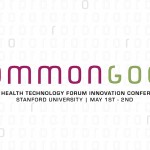HTF LA Meetup Sheds Light on Tech Resources for Elderly & Disabled
HTF Los Angeles hosted its April Meetup event at the USC Health Science Campus, sponsored by USC’s own Health Technology Engineering program. We had an incredible presentation on UX strategy for the elderly and panel on innovations in care for the elderly and disabled. Speakers were Dr. George Tolomiczenko, Dr. Wen Dombrowski, Dr. Donna Bennett, and Vanessa Terzian. The event attracted care advocates, physicians, law enforcement in fraud protection for the elderly and more!
USC HTE Director George Tolomiczenko consults medical and engineering students on how to develop solutions in the health tech sphere. His expertise is particularly in user experience and design thinking. Tolomiczenko urges that we link doctors, engineers, and design thinkers. He also notes the critical component of design thinking is capturing a human element. Meaning, the better you can get your user experiences, the better your team will identify an underlying need as well as the viability and sustainability for your business. Iteration and rapid prototyping are also critical to make substantial progress in your pursuits.
To develop technology for healthy aging, Tolomiczenko instructs that we ask exactly what is healthy aging and what are the things people face on a day-to-day basis. It’s imperative to remove assumptions about the population we are serving. Look at needs, look at the interaction with tech or with people. Developers shouldn’t get frustrated by users who are confused/unsatisfied by a product. Rather, identify what could be improved by receiving feedback.
Technology has to enable behavior change. However, understand social determinants of health impact the majority of your well-being. It’s not just lack of compliance for a behavior such as lack of medication adherence. It could be external factors as well that are hindering the ability to comply. Therefore, understand what the parameters are that you can work with and work gradually.
Tolomiczenko shares an interesting analogy: user experience is a lot like constructing games where you map out criteria you want to optimize for a healthy life.
—
Next, on our roster was Dr. Donna Benton who manages the Los Angeles USC Family Caregiver Support Center. Benton begins by changing the notion of who a caregiver is. She asks, “what is a family caregiver?” When people think of caregivers, they may assume that it’s a paid caretaker for a senior citizen. However, family caregivers are unpaid that care for all ages and can be children, parents, spouses, etc. 1 out of 4 people are family caregivers.
Recognizing that family caregivers needed an individualized way to be assessed and supported, Benton and her team created a free digital platform with a tailored plan for how to care for their loved ones.
This information should be connected with health care systems because when patients get discharged, it’s often the caregiver who is responsible for implementation for the person post-discharge to prevent readmissions. “Caregivers are the eyes and ears of the home”. However, hospitals are shouldn’t assume that caregivers will be there for the patient full-time (that isn’t the case typically with family caregivers). Thus, the electronic record should help.
—-
We also had Vanessa Terjian, attorney and co-founder of seniorproviders.com, enlighten us on the complexities of the legal system for elderly and disabled patients and the need for improved access to resources.
Terjian notes that 10,000 people are turning 65 every day. Additionally, 15% of the workforce is serving as a caregiver, but in the next 5 years, 50% of the workforce will be caregivers in some form. Resources online are very fragmented and very confusing: In-home care vs. non-medical care, legal documents, HIPAA, power of attorney, Medicare versus Medical, etc.
Fortunately, seniorproviders.com provides a decision support tool and space for people to freely ask a question to assess what resonates with people. The site navigates users by reviewing various scenarios such as hospital discharge, providing a list of action items, and connecting users to quality vetted professionals who are key agents.
Terjian’s closing includes advice on how to convey empathy for people. Listen to what the problem is. Approach these issues with IRAC: issue, rule, application, and conclusion.
—-
Last but certainly not least, was geriatrician and consultant Dr. Wen Dembrowski. Echoing Dr. Tolomiczenko, she asks that we identify our core users which could be an employer, a patient, a doctor. What are the needs of the people out there? Identify pain points. Don’t just develop things for people, develop the solutions with the people who need it. People are increasingly turning to the internet for information so it’s challenging to have resources all over the place. Information technology can connect these disparate resources. Patients no longer wait, it’s self-service, self-directed. The more info we can provide in a curated manner, the easier it will be. Finding a trusted source that a doctor or employer recommends, it will be easier for all caregivers.
Now, as far as the various tech applications in healthcare, Dembrowski highlights teleconferencing, sensors, apps, VR, and AI, hardware/robotics, and voice recognition. Digital therapies include VR with the assessment of Dementia or treatment of cognitive conditions, memory or physical exercise. AI use-cases for supporting an older person demonstrate the ability to predict needs such as when someone is getting sick or know the the best resource provider for someone.
Dembrowski notes, while these innovations are quite advanced and may be daunting for users, the easiest entry point for all ages and to get acquainted are to start with simple technology.



